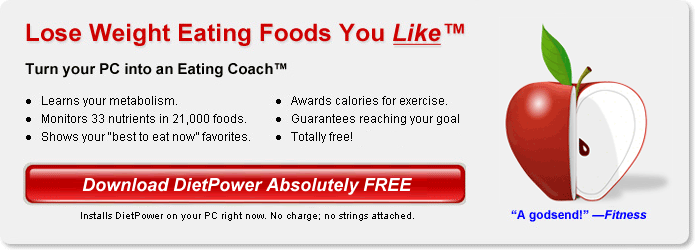The Best Diabetic Diet...
...may not be what you think.
Until only recently, experts thought that sugar was to diabetics what kryptonite was to Superman.
But the understanding of diabetes has progressed faster than a speeding bullet, and with that
comes sweet news for people with the disease.
If you're a diabetic, it's OK to have a cookie for dessert or accept a slice of Aunt Mabel's fruitcake.
In fact, according to the guidelines of the American Diabetes Association, you can eat just about anything you like.
There's a caveat, however: You need to pay attention to your diet as a whole and monitor your blood
sugar level two hours after meals to see whether any individual food has elevated it.
Still, there is no longer any such thing as a "diabetic diet."
A Carb Is a Carb
Sugar was once thought to spike your blood sugar more than any other food, but research now shows
that it does no more harm than a potato. Both foods are carbohydrates, which are a major source of
energy. Sugars are known as "simple" carbohydrates. Until about a decade ago, most experts thought
that since sugars were more easily absorbed into the bloodstream, they did their dirty work sooner.
"Complex" carbohydrates include dairy foods; starches such as potatoes, rice, and corn; and other
fruits and vegetables.
Your body doesn't care where your carbohydrates come from, as long as you count them. How many you
need depends on individual considerations (such as how serious your diabetes is) and your weight,
which in turn will determine how many calories you'll need in a day. Roughly half your calories should
come from carbohydrates. So you'll have a carbohydrate allowance each day; how you spend it is up to you,
as long as you distribute the carbs evenly so as not to create any surges in your glucose levels.
Carbohydrates are measured in grams, and one gram equals four calories. So if you opt for a slice of pie at
lunch, you should think twice about having a second bowl of rice at dinner.
 The ADA says your best bet is to get as many carbohydrates as you can from fruits,
whole-grain foods, and low-fat dairy products—not processed foods.
The ADA says your best bet is to get as many carbohydrates as you can from fruits,
whole-grain foods, and low-fat dairy products—not processed foods.
Diabetics are normally urged to eat meals and snacks at roughly the same time each day.
Be careful about your alcohol intake. Beer and wine provide calories and carbohydrates,
so they count, too. And if you're diabetic, when you drink alcohol you should also consume food.
If you're overweight—a major risk factor for Type 2 diabetes, you'll need to lose some pounds
through diet and exercise. Here's where DietPower® can help. DietPower is a computer program
that keeps track of your intake of calories and 32 other nutrients as you record your meals.
Your Computer Can Help
Morgan Haiduk, of Dallas, Texas, newly diagnosed with diabetes, decided to try keeping it under
control with DietPower. In just a few months, he lost nearly 70 pounds. His dietitian could offer no additional advice. His doctor called him "a stud."
"It's a simple, simple program," he said. "I don't count calories. The program does it for me."
Haiduk was diagnosed almost by accident. His sister, who had developed a form of diabetes unique
to pregnant women, became obsessed with the glucose levels of her loved ones. On three occasions,
she pricked his finger, only to find that his glucose was unusually high. He had had no other symptoms
or family history of the disease (aside from his sister's), but the 365 pounds he carried made him
a prime candidate for Type 2 diabetes.
The diagnosis whipped Haiduk, a 32-year-old, unemployed salesman, into shape. Overnight, he decided
to do away with his sedentary lifestyle and eat better. He bought DietPower a day later.
 Haiduk started walking several times a week and bought a NordicTrack machine—one that actually gets used.
He substituted fish and chicken for beef, and vegetables started outnumbering meat portions at every meal
(meat isn't a good source of carbs). "I have a plateful of food, but most of it is carbohydrates," he says.
He started using light pancake syrup instead of regular; he found no difference in taste, but the regular
syrup had 10 times as many calories. (That's one problem with sugar; it provides lots of calories with no
vitamins or minerals in return.)
Haiduk started walking several times a week and bought a NordicTrack machine—one that actually gets used.
He substituted fish and chicken for beef, and vegetables started outnumbering meat portions at every meal
(meat isn't a good source of carbs). "I have a plateful of food, but most of it is carbohydrates," he says.
He started using light pancake syrup instead of regular; he found no difference in taste, but the regular
syrup had 10 times as many calories. (That's one problem with sugar; it provides lots of calories with no
vitamins or minerals in return.)
He spends only minutes a day entering his exercise and what he eats into DietPower's program. He can also
click on a sneak preview of the carbohydrate and caloric contents of foods in DietPower's Food Log.
The nutritional values "are right there in red, blue, and green," he says. "It's hard to miss."
Haiduk knows that taming his diabetes will be "a marathon, not a sprint." But he's managed to avoid using
medication to control his condition. And with the help of DietPower, his doctor told him he "started out
of the gate fast."
To comment on this article, .
Below are more pages that will help you understand and combat diabetes.
All are carefully checked for scientific accuracy.




